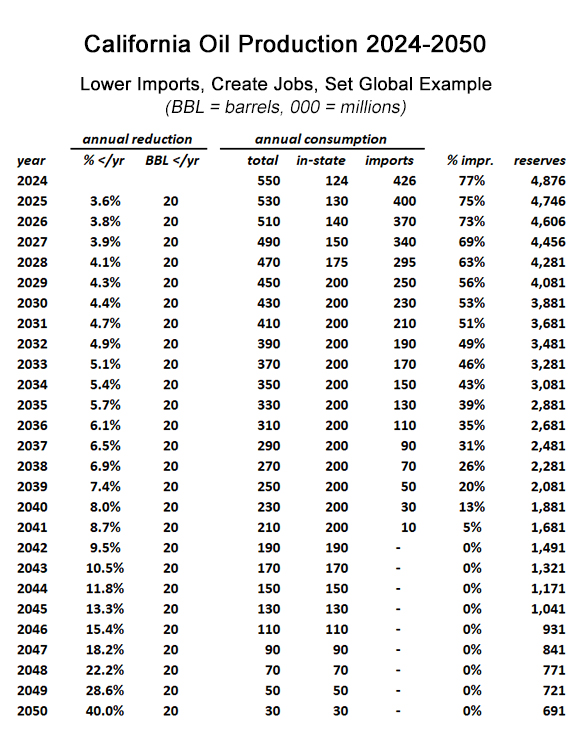What’s Current? Issue #40 – The Case for Oil Drilling in California
The regulatory war on oil production in California is well documented. The motivations of California’s state legislature in some cases may be well intentioned, but the regulations coming down right now are designed to destroy the oil industry in the state within a few years. Investment in energy infrastructure, certainly including extracting and refining oil, takes decades and requires regulatory certainty. What is happening today in California delivers neither. The only thing certain is that as in-state production is abandoned, imports will increase.
California’s in-state production of oil peaked in 1986 at 402 million barrels, which at the time fulfilled 60 percent of the state’s annual consumption of 676 million barrels. The decline since then has been steep. In 2023 California’s total production was down to 124 million barrels, while overall consumption only dropped to 528 million barrels. Today, 77 percent of California’s oil is imported.
This isn’t happening because California is running out of oil. Commercially recoverable and proven reserves are currently estimated at 2.3 billion barrels, but this is only a fraction of the total estimated reserves in the state. Just the Monterey Shale Formation in California holds another estimated 15 billion barrels. Onshore and offshore, California’s potentially recoverable oil reserves are sufficient to revive the industry for several decades.
Critics correctly point out that California’s reserves of oil are heavier than sources elsewhere, requiring more energy to extract and refine. This fact, however, may be a reason in favor of reviving oil production in the state. California’s idealistic legislators need to confront one nonnegotiable reality: other nations are not going to stop consuming oil for at least the next several decades. It is mathematically impossible. The Athabasca tar sands in Canada, Venezuela’s Orinoco Basin, and other giant fields in Iraq, Indonesia, China, Brunei, Mexico, Egypt, Qatar and Kazakhstan are all places where heavy oil reserves are already being exploited. Wishful thinking aside, it’s not going to stop.
California has an opportunity to extract its own heavy oil, along with its remaining and substantial reserves of lighter and more easily extracted oil, in a manner that sets an example to the world. There is no environmental upside to destroying California’s oil industry before Californians stop relying on oil. All that will happen is 100 percent of the environmental impact of oil extraction will be exported elsewhere. As it is, in 2023 California’s total energy inputs were still 50 percent dependent on oil. To continue to import oil, instead of producing more of it in-state, is an abdication of environmental responsibility completely inconsistent with California’s values.
The world isn’t going to stop using oil before 2050, and neither is California. So why not create tens of thousands of great jobs in the oil industry, and extract more oil in-state in a manner that permits Californian companies to pioneer cutting edge clean drilling and refining technologies that can be exported to the world?
The following chart depicts a scenario whereby California’s oil industry expands back to production of 200 million barrels per year, and holds at that level until the state’s total oil consumption falls under that amount. Based on a realistic estimate of recoverable reserves of 5,000 million barrels at the beginning of 2024, this 25 year plan gives the industry time to ramp up, then systematically scale back production in conformity with global objectives to eliminate fossil fuel use by 2050. According to this timetable, California’s annual oil production would expand to reach 200 million barrels by 2029, and the state would become completely independent of imported oil by 2041, at which point in-state production would begin to decline.

California’s climate warriors, the special interests who find them useful, and the state legislators who adhere almost slavishly to whatever they’re told to do whenever the magic word “climate” is uttered, are invited to explain why this scenario wouldn’t have a more positive impact on the environment than business as usual. Is their faith in California’s capacity to out-innovate other regions so fragile that they can’t imagine petroleum engineers from a revived industry fanning out to the far corners of the world to share clean drilling and refining technologies that only exist because they were allowed to develop them right here?
The underlying assumption behind this approach is that it is better to not just mandate the emergence of new renewable energy technologies, but to also manage the environmental quality of the conventional energy technologies that are eventually going to be displaced. The current strategy seems to rely on a belief that they can simply be winked out of existence. They cannot. To ignore this critical part of the equation denies the fact that 80 percent of global energy is still derived from fossil fuel, and as well denies the fact that for everyone on earth to consume half as much energy per capita as Americans, global energy production will have to double. Based on those two cold facts, fossil fuel is going to be around for a very long time.
Accepting that California should set an example that people in the world are willing to follow has energy policy implications that go beyond oil. Why not permit advanced hybrid cars instead of limiting new technologies to pure EVs? Why not permit advanced natural gas power plants that use combined cycle technology to achieve efficiencies of 80 percent or more? And where are the nukes? If California is serious about eliminating fossil fuel, why aren’t we building nuclear power plants?
California’s path forward might best be found through a legislative and regulatory strategy that explores a fusion of legacy and future energy technologies. Doing this acknowledges the immutable reality that fossil fuel is not going away. Legislators who truly want to solve environmental problems must ask themselves, what is the upside of killing your own economy while alienating the entire world in pursuit of a fantasy?
